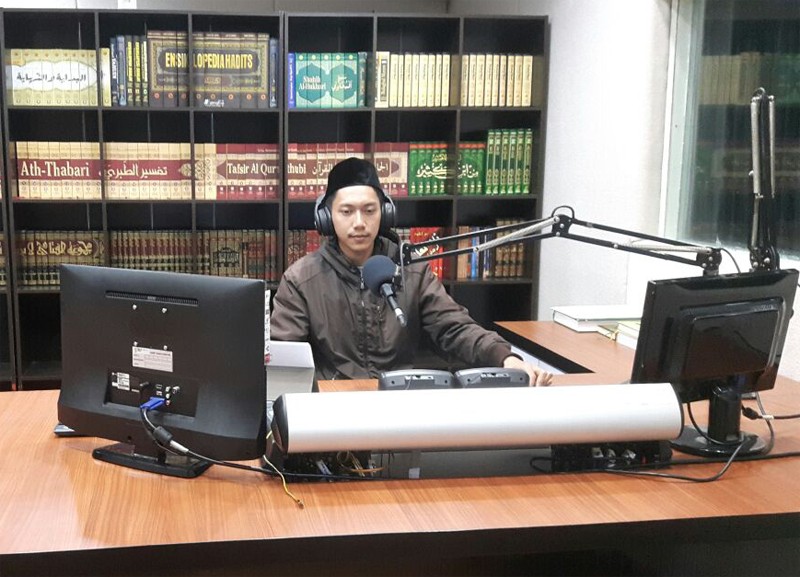Popular Reads
Top Results
Can't find what you're looking for?
View all search resultsPopular Reads
Top Results
Can't find what you're looking for?
View all search resultsSalafi movement gains ground in public sphere
Change text size
Gift Premium Articles
to Anyone
A
radio station in Batam, Hang FM, recently made headlines when Singaporean authorities accused it of spreading extremist ideology and radicalizing two of its citizens, who had been arrested under the Internal Security Act for allegedly trying to join the Islamic State (IS) group in Syria.
The city-state’s ministry of home affairs alleged that Rosli Hamzah, 50, and Mohamed Omar Mahadi, 33, started listening to Hang FM between 2009 and 2010, after which they became interested in “armed jihad” and IS.
The radio station has strongly denied the allegations and has also been cleared by the Indonesian Broadcasting Commission (KPI), which said Hang FM’s religious messages had changed after 2014.
The incident has focused attention on a growing number of religious radio stations associated with the Salafi movement that have been operating freely in Indonesia’s public sphere.
Hang FM has long been accused of spreading Salafism, even though its owner, Zein Alatas, has rejected that label and said he was only trying to propagate Islam.
Salafism is an ultra-conservative movement within Sunni Islam, originating mainly from countries like Saudi Arabia and Yemen. While the majority of its proponents denounce radicalism and terrorism, some people claiming to be Salafis, including al-Qaeda and IS fighters, have been engaged in violent jihad.
Nahdlatul Ulama (NU), the largest Islamic organization in this country, recently launched the Islam Nusantara campaign in an attempt to counter Salafism, which it said was not suitable for Indonesians.
Ayang Utriza Yakin, a researcher at the Syarif Hidayatullah State Islamic University (UIN) who focuses his studies on the Salafi movement, said Indonesian Salafis relied more on radio than door-to-door campaigns to reach a wider audience across the archipelago. That strategy, he said, had been effective.
“Many people have become Salafi-Wahabi followers. Bankers leave their jobs, female teachers give up their jobs, as well as artists. If the KPI does not take action to contain it, then their attempt to make Indonesia a Salafi country will be successful and, for me, that is a real threat to our diversity,” he told The Jakarta Post on Thursday.
Recently, the country’s independent music scene was shaken by the news that former members of two veteran indie bands, Pure Saturday and The Upstairs, had joined a Salafi group called the Strangers al-Ghuraba, which considers music haram, or forbidden under Islamic law.
It is unclear how many Salafi radio stations operate in Indonesia, but their number is estimated to have reached more than a hundred. The Salafy Forum on its website forumsalafy.net listed 25 Salafi radio stations located across the country that can be accessed through online streaming, including Radio Rasyid, Radio Salafy Siar, Radio Salafy Bandung and Radio Salafy Makassar.
Ayang said of all the Salafi radio stations in the country, Radio Rodja had the largest network.
Rodja’s campaign of Salafi ideology is sophisticated and supported by high-tech equipment, enabling it to broadcast its messages through its six official branches and 65 other radio stations under its network in Indonesia both on AM and FM frequencies. In addition, Rodja now has a cable TV program to serve viewers nationwide.
Ayang analyzed the sermons aired by Rodja for six months this year and found that its preachers encouraged intolerance and rejected modernity.
“[Radio] Rodja uses a public frequency. There should be control from the Communications and Information Ministry and the KPI as to how public space is used,” he said.
Rodja’s operational director Abu Abdurrahman Fawwaz, however, denied Ayang’s claims, saying the broadcaster only aired Islamic teachings that were based on the Quran and prophetic tradition.
“Whether our [preaching] is considered extreme or not is just a matter of which point of view you
want to use to look at it,” Fawwaz told the Post.










